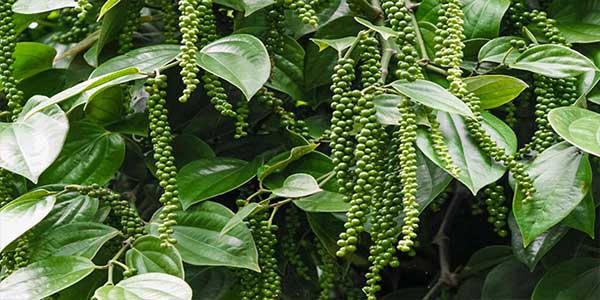Introduction of Pepper or Peppercorns (Kali Mirch) :
Pepper or Peppercorns, also known as Kali Mirch, is one of the most widely used spices in culinary traditions around the world. It is prized for its distinct flavor, aromatic qualities, and versatile applications in cooking. In addition to its culinary uses, black pepper also offers numerous health benefits. In this comprehensive article, we will explore the details of black pepper as a cooking ingredient, including its uses, qualities, origin, sources, applications, health benefits, use in cooking, how to use it, and potential side effects.
Origin and Sources of Black Pepper or Peppercorns (Kali Mirch):
Black pepper is native to the Malabar Coast of India and has been used in cooking for thousands of years. It is derived from the fruit of the Piper nigrum plant, a flowering vine that is cultivated in tropical regions. The berries of the plant are harvested when they are still green and unripe, and then dried to produce black peppercorns. These peppercorns are readily available in both whole and ground forms and can be found in most grocery stores, spice shops, and online retailers.

Qualities of Black Pepper or Peppercorns (Kali Mirch):
Black pepper is known for its pungent and slightly spicy flavor, along with its distinctive aroma. It contains an active compound called piperine, which is responsible for its characteristic taste and various health benefits. The peppercorns are small and round, with a wrinkled and textured surface. They can range in color from dark brown to black, depending on the degree of ripeness and the processing method.
Uses and Applications Black Pepper or Peppercorns (Kali Mirch):
Black pepper is a versatile spice that adds depth and complexity to a wide range of dishes. It is used in various forms, including whole peppercorns, coarsely ground pepper, and finely ground pepper. Here are some common uses and applications of black pepper in cooking:
Seasoning and Flavoring: Black pepper is a staple spice used to season and enhance the flavor of savory dishes. It is commonly added to meats, poultry, seafood, vegetables, soups, stews, sauces, and marinades. Its sharp and spicy taste provides a balance to other flavors and adds a pleasant kick to the dish.
Table Condiment: Ground black pepper is often used as a table condiment, allowing individuals to add it to their food according to their preference. It is commonly found in salt and pepper shakers, providing a convenient way to season meals at the dining table.
Spice Blends: Black pepper is a key ingredient in many spice blends and seasoning mixes. It is often combined with other spices such as cumin, coriander, turmeric, and cinnamon to create flavorful blends used in Indian, Middle Eastern, and international cuisines.
Pickling and Preserving: Black pepper is sometimes used in pickling recipes, providing a distinctive flavor and enhancing the preservation process. It adds complexity to pickled vegetables, chutneys, and relishes.

Health Benefits of Black Pepper or Peppercorns (Kali Mirch):
In addition to its culinary uses, black pepper offers several potential health benefits. Here are some of its notable health benefits:
Digestive Health: Black pepper has long been used to support digestive health. It stimulates the secretion of digestive enzymes, promotes healthy digestion, and can alleviate symptoms such as bloating, gas, and indigestion.
Anti-inflammatory Properties: Piperine, the active compound in black pepper, has anti-inflammatory effects. It may help reduce inflammation in the body, which is associated with various chronic conditions such as arthritis, heart disease, and certain types of cancer.
Antioxidant Activity: Black pepper contains antioxidants that help neutralize harmful free radicals in the body. These antioxidants may help protect against cellular damage, support the immune system, and reduce the risk of chronic diseases.
Improved Nutrient Absorption: Piperine in black pepper has been found to enhance the absorption of nutrients, including vitamins and minerals, in the body. This can be particularly beneficial for individuals with nutrient deficiencies or those seeking to optimize nutrient absorption.
Respiratory Health: Black pepper has been used in traditional medicine to alleviate respiratory conditions such as coughs, colds, and congestion. Its warming and expectorant properties may help soothe respiratory passages and promote mucus clearance.
Use of Pepper or Peppercorns (Kali Mirch) in Cooking:
Black pepper can be used in various forms depending on the recipe and desired intensity of flavor. Here are some tips on using black pepper in cooking:
Whole Peppercorns: Whole black peppercorns can be used in dishes where a milder and more subtle flavor is desired. They can be added to soups, stews, and simmering dishes, allowing the flavors to infuse gradually. Remove whole peppercorns before serving.
Coarsely Ground Pepper: Coarsely ground black pepper is ideal for seasoning grilled meats, roasted vegetables, and salads. Its texture adds a pleasant crunch and bursts of flavor.
Finely Ground Pepper: Finely ground black pepper is commonly used in recipes where a more intense and even distribution of flavor is desired. It can be added to sauces, dressings, marinades, and baked goods.
Freshly Ground Pepper: For the best flavor and aroma, it is recommended to grind black peppercorns just before use. This ensures that the essential oils and piperine are freshly released, providing a more vibrant taste.

Side Effects and Precautions of Pepper or Peppercorns (Kali Mirch):
Black pepper is generally safe for consumption when used in culinary amounts. However, there are a few considerations to keep in mind:
Allergies: Some individuals may have allergies or sensitivities to black pepper. If you experience any adverse reactions, such as itching, swelling, or difficulty breathing, discontinue use and seek medical attention.
Gastric Irritation: Excessive consumption of black pepper may cause gastric irritation or exacerbate existing gastrointestinal conditions such as ulcers or gastroesophageal reflux disease (GERD). It is advisable to consume black pepper in moderation and consult with a healthcare professional if you have any underlying digestive issues.
Medication Interactions: Black pepper may interact with certain medications, including blood-thinning drugs and medications for high blood pressure. If you have any underlying medical conditions or are taking medications, it is recommended to consult with a healthcare professional before incorporating black pepper into your diet.
Conclusion:
Black pepper, also known as Kali Mirch, is a versatile spice that adds flavor, aroma, and numerous health benefits to a wide variety of dishes. Its distinct taste and aromatic qualities make it a beloved ingredient in culinary traditions worldwide. Whether used as a seasoning, table condiment, or spice blend component, black pepper enhances the flavors of savory dishes, providing a pleasant and spicy kick.
Beyond its culinary applications, black pepper offers potential health benefits, including digestive support, anti-inflammatory properties, antioxidant activity, improved nutrient absorption, and respiratory relief. By incorporating black pepper into your cooking and enjoying its vibrant flavors, you can elevate the taste of your meals while potentially reaping the health benefits it has to offer.
Remember to experiment with different forms of black pepper, including whole peppercorns and ground pepper, to explore the range of flavors and intensities. Whether adding a sprinkle to your favorite dishes or creating delicious spice blends, black pepper is a versatile ingredient that can transform ordinary meals into extraordinary culinary experiences.